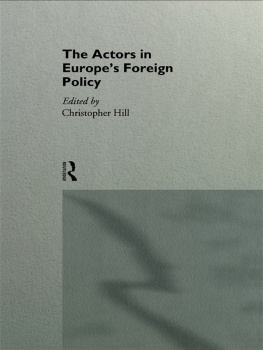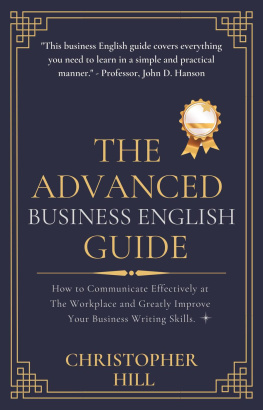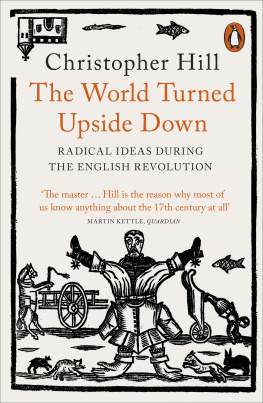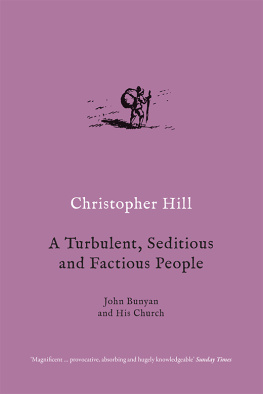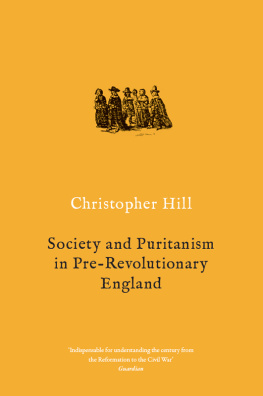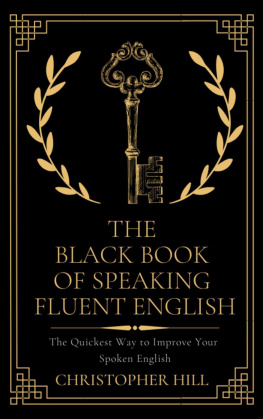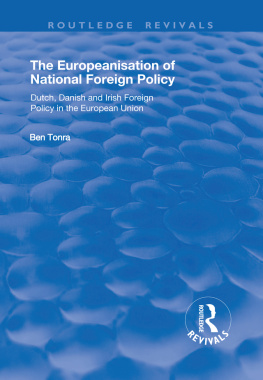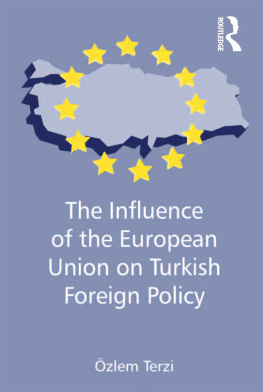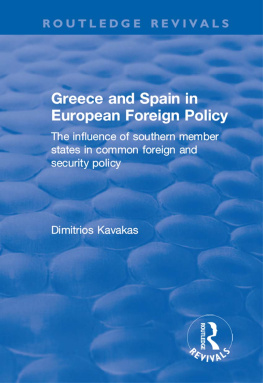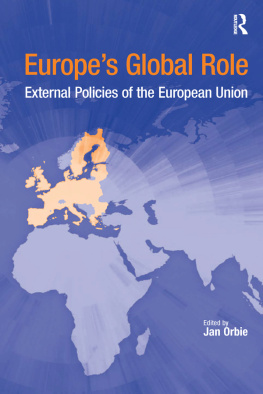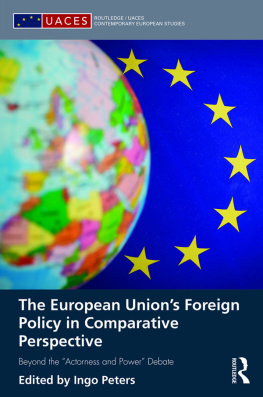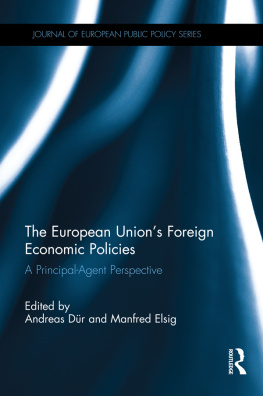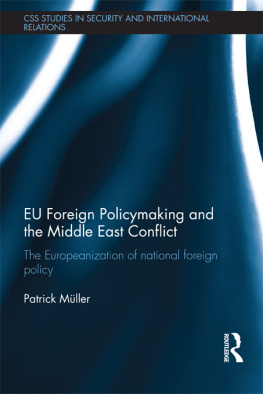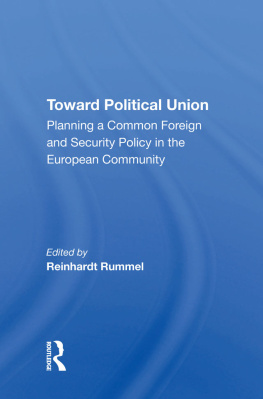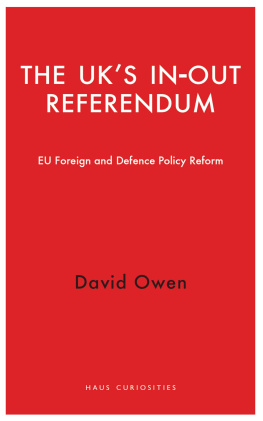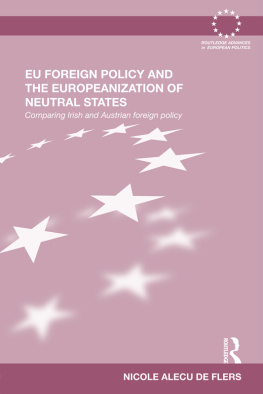The Actors in Europes Foreign Policy
The question of whether Europe has a collective foreign policy is an issue thathas surfaced with prominence during many recent crises, most notably whenIraq invaded Kuwait and over the recent war in the Balkans. The contributors inthis book argue that the European Union has certainly made strides towardsacting as a single bloc, but that expectations have raced ahead of achievements.
The aim of the books multinational authorship is to look at the reality of Europeanforeign policy-making rather than the hopes held out for it. They do so byexamining the policy of the member states and their experience in trying tomake their national concerns converge with the collective view. The Commission,the main supranational institution to be active in external relations, is discussedin a separate chapter. The authors seek to go beyond generalities about Europeto portray the actual positions of member states and to what extent they aremoving towards a collective voice.
The book shows how the foreign policies of the individual states now workwithin a broad common framework and that the key to an understanding of theinternational politics of Western Europe is the interplay between the national andthe collective.
Christopher Hill is Montague Burton Professor of International Relations atthe London School of Economics. He has written widely on issues of foreignpolicy analysis, particularly British foreign policy and the external relations of theEuropean Community.
The Actors in Europes Foreign Policy
Edited by
Christopher Hill
First published 1996
by Routledge
11 New Fetter Lane, London EC4P 4EE
Simultaneously published in the USA and Canada
by Routledge
29 West 35th Street, New York, NY 10001
Routledge is an International Thomson Publishing company
This edition published in the Taylor & Francis e-Library, 2002.
1996 Christopher Hill, the edited collection; individualcontributions 1996 the contributors
All rights reserved. No part of this book may be reprinted or reproduced or utilized in anyform or by any electronic, mechanical, or other means, now known or hereafter invented,including photocopying and recording, or in any information storage or retrieval system,without permission in writing from the publishers.
British Library Cataloguing in Publication Data
A catalogue record for this book is available from the British Library
Library of Congress Cataloguing in Publication Data
The Actors in Europes foreign policy/edited by Christopher Hill.
p. cm.
Includes bibliographical references and index.
1. Europe-Foreign relations1989 2. European Union. I. Hill, Christopher, 1948 .
D2009.A37 1996
327.4dc20 9611315
CIP
ISBN 0-415-12222-8 (hbk)
ISBN 0-415-12223-6 (pbk)
ISBN 0-203-19823-9 Master e-book ISBN
ISBN 0-203-19826-3 (Glassbook Format)
Contributors
David Allen Senior Lecturer in European Studies, University of Loughborough,UK.
Esther Barb Professor of International Relations, Facultat de CinciesPolitiques i de Sociologia, Universitat Autnoma de Barcelona, Spain.
Gianni Bonvicini Director, Istituto Affari Internazionali, Rome, Italy.
Christian Franck Professor at the Institut dEtudes Europennes, Uni-versitCatholique Louvain-la-Neuve, Louvain-la-Neuve, Belgium.
Bertel Heurlin Research Director, Danish Institute of International Affairsand Jean Monnet Professor, University of Copenhagen, Denmark.
Christopher Hill Montague Burton Professor of International Relations,London School of Economics and Political Science, UK.
Patrick Keatinge Jean Monnet Professor of European Integration, TrinityCollege, Dublin, Ireland.
Franoise de La Serre Directeur de Recherches, Centre dEtudes et deRecherches internationales (CERI), Fondation nationale des Sciences politiques,Paris, France.
Pierre-Louis Lorenz Member of the Diplomatic Service of Luxembourg,presently Luxembourg Ambassador in Beijing, China.
Simon Nuttall Visiting Fellow, Centre for International Studies, London Schoolof Economics and Political Science, UK, and Visiting Professor, College ofEurope, Bruges, Belgium.
Alfred Pijpers Senior Staff Member, Europa Institute, University ofAmsterdam, and Department of Political Science, University of Leiden, theNetherlands.
Reinhardt Rummel Senior researcher, Stiftung Wissenschaft und Politik,Ebenhausen, Germany.
Panos Tsakaloyannis Visiting Professor, Athens University of Economicsand Business, Department of International and European Economic Studies,Athens, Greece.
lvaro de Vasconcelos Director, Istituto de Estudos Estratgicos eInternacionais, Lisbon, Portugal.
William Wallace Reader in the Department of International Relations,London School of Economics and Political Science, UK, and Professor at theCentral European University, Budapest, Hungary.
Preface
This book is the successor to National Foreign Policies and European Political Cooperation,published by George Allen and Unwin for the Royal Institute of InternationalAffairs in 1983. The present volume advances the themes explored in the first ina number of significant respects. Unusually, it also draws on a high proportion ofthe same participants as in 1983, thus making possible a high degree of continuityand comparability.
National Foreign Policies met a clear need, being the first comparative study ofEuropean foreign policies which was also the product of a multinational group ofscholars from all the EC states. It sold out its print run and was thereafter inpersistent demand from students and observers of European affairs. It representeda particular perspective on European foreign policy which was otherwise barelyrepresented in the literatureand is still thin on the ground. This is far frombeing an ideological positionthe contributors disagree widely amongst themselveson, for example, the desired future path for the European Union. It is, rather, acorrective to the general tendency to discuss European Political Cooperation(EPC), and from 1993 the Common Foreign and Security Policy (CFSP) largelyin terms of the common positions and joint actions which they are supposed tohave produced, with the states left on the margins of the analysis. This tendencyis more common these days than the opposite, crassly realist mistake of assumingthat Europes international presence amounts to little more than the sum of thenational interests of the EUs two or three major states. Rather, the premise ofboth this volume and that of 1983 was that this important and fascinating newdevelopment in international diplomacy can only be understood properly interms of the interplay between the attempts at collective action on the one handand the national foreign policies which continue vigorously, on the other.
Accordingly, from the early 1990s I have had it in mind to produce a sequel toNational Foreign Policies which would do more than simply change dates and add apage or two of contemporary history to each chapter. That I was able to do wasthanks to the hospitality and resources of the European University Institute atSan Domenico di Fiesole near Florence, where I was privileged to spend a sabbaticalyear. At the end of that time, in July 1993, the European Policy Unit of theInstitute hosted an expert conference on the theme of The Community, the Member States and Foreign Policy: Coming Together or Drifting Apart?. Thetwin aims of the conference were (i) to examine whether or not EPC hadfundamentally changed in character over the previous decade, in particular as aresult of the upheavals of 198993; and (ii) to analyse the interaction betweenthe various participants in EPC, both states and Community institutions.

